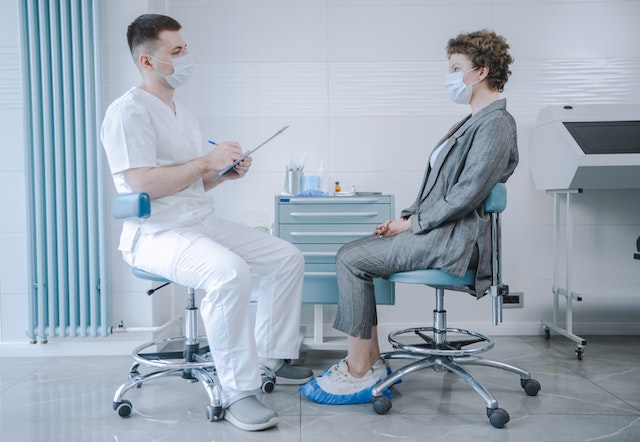Anxiety, a prevalent mental health condition, afflicts millions of people worldwide, exerting a profound impact on various facets of life. Its effects can be debilitating, impeding daily functioning and well-being. To combat anxiety, individuals may turn to medication, and one such option is Lexapro (generic name: escitalopram).
Lexapro is an antidepressant and anxiolytic medication that belongs to the selective serotonin reuptake inhibitor (SSRI) class. One crucial aspect of using Lexapro effectively is knowing the best time to take it. In this article, we will delve into the best time to take Lexapro for anxiety which can influence the optimal time for Lexapro intake to manage anxiety symptoms.
Understanding Lexapro and Its Mechanism:
Before delving into the best time to take Lexapro for anxiety, it is essential to understand how the medication works. As an SSRI, Lexapro works by increasing serotonin levels, a neurotransmitter associated with mood regulation, in the brain. By inhibiting the reabsorption of serotonin, Lexapro helps maintain higher levels of the neurotransmitter, which can alleviate symptoms of anxiety and depression.
Factors Affecting the best time to take Lexapro for anxiety:
Doctor’s Recommendation:
The most critical factor in determining the optimal time to take Lexapro is following your doctor’s advice. Healthcare professionals consider individual characteristics such as medical history, lifestyle, and existing medications before recommending the ideal timing for Lexapro intake.

Dosage and Formulation:
Lexapro comes in different dosage strengths and formulations. Some individuals may be prescribed a single daily dose, while others might require divided doses. This can influence the timing of Lexapro intake.
Personal Response to Medication:
Everyone’s response to medication can vary. Some individuals may find Lexapro more effective when taken at a specific time of day due to differences in their body’s metabolism and the way they process the medication.
Symptoms and Daily Routine:
Attention to when anxiety symptoms are most prominent can also guide the timing of Lexapro intake. If anxiety is more pronounced in the morning, taking Lexapro in the evening might not provide optimal relief.
Morning vs. Evening Dosing:
There is no one-size-fits-all answer to the best time to take Lexapro for anxiety, as it largely depends on the factors mentioned above. However, the two most common dosing times are morning and evening.
Morning Dosing:
Taking Lexapro in the morning offers the advantage of aligning with an individual’s daily routine. By doing so, the medication can be taken consistently, making it easier to remember. Additionally, morning dosing may better address symptoms that tend to peak during the day, allowing for improved functioning throughout the day.
Evening Dosing:
Some individuals prefer taking Lexapro in the evening because it can minimize potential side effects, such as drowsiness, as they sleep through it. Additionally, for those who experience heightened anxiety in the evening, evening dosing might be more effective in controlling symptoms during those critical hours.
Tips for Optimal Lexapro Administration:
Stick to a Schedule:
Whether taking Lexapro in the morning or evening, adhering to a consistent dosing schedule is vital. Set an alarm or incorporate it into a daily routine to help remember to take the medication at the same time every day.
Be Patient:
It may take a few weeks for Lexapro to reach its full therapeutic effect. Be patient and continue taking the medication as prescribed, even if immediate improvements are not apparent.
Avoid Abrupt Changes:
If you decide to switch the time of day you take Lexapro, consult your doctor first. Abrupt changes in dosing times may affect the medication’s efficacy or cause unwanted side effects.
Communicate with Your Doctor:
Open communication with your healthcare provider is essential throughout the treatment process. If you experience any side effects or have concerns about the timing of Lexapro intake, discuss them with your doctor.
Conclusion:
Finding the best time to take Lexapro for anxiety can significantly impact its effectiveness in managing symptoms. While there is no universal answer, personal factors, individual response, and the type of anxiety experienced are essential considerations. Always follow your doctor’s recommendations and maintain open communication to ensure optimal results from Lexapro treatment.
Remember that medication alone may not be sufficient for managing anxiety, and combining it with therapy, lifestyle changes, and support systems can lead to more comprehensive and successful outcomes in anxiety management.
(Note: This article is for informational purposes only and should not be considered medical advice. Consult a qualified healthcare professional for personalized recommendations.)
FAQs about the Best Time to Take Lexapro for Anxiety:
1. When is the best time to take Lexapro for anxiety?
The best time to take Lexapro for anxiety can vary from person to person. It depends on individual factors, including response to the medication, lifestyle, and the specific symptoms experienced. Generally, taking Lexapro in the morning or evening is common. Morning dosing may be preferred for those who experience heightened anxiety during the day, while evening dosing might be suitable for individuals who want to minimize daytime drowsiness or manage evening anxiety.
2. Should I take Lexapro with food?
Lexapro can be taken with or without food. Some people find that taking it with a meal helps reduce stomach discomfort, while others may prefer taking it on an empty stomach. The decision to take Lexapro with food should be based on personal preference and any guidance provided by your healthcare professional.
3. Can I change the time of day I take Lexapro on my own?
It is essential to consult your healthcare provider before changing the time of day you take Lexapro. Abrupt changes in dosing times may affect the medication’s effectiveness or cause unwanted side effects. Always seek medical advice before making any modifications to your medication regimen.
4. Can I split my Lexapro dose throughout the day?
The dosing schedule for Lexapro may vary depending on individual needs. Some people may be prescribed a single daily dose, while others might require divided doses. If your healthcare provider recommends splitting your dose, follow their instructions carefully.
5. How long does it take for Lexapro to start working for anxiety?
It may take several weeks for Lexapro to reach its full therapeutic effect in managing anxiety symptoms. It is essential to be patient and continue taking the medication as prescribed, even if immediate improvements are not apparent.
6. Can I drink alcohol while taking Lexapro for anxiety?
It is generally advisable to avoid or limit alcohol consumption while taking Lexapro. Alcohol can interact with the medication, potentially increasing the risk of side effects and reducing its effectiveness in managing anxiety.
7. What should I do if I experience side effects while taking Lexapro?
If you experience any side effects while taking Lexapro, contact your healthcare provider immediately. They can assess the severity of the side effects and may adjust your dosage or recommend alternative treatments if necessary.
8. Is Lexapro the only treatment for anxiety?
Lexapro is one of many treatment options for anxiety, but it is not the only one. Anxiety management often involves a combination of medication, therapy, lifestyle changes, and self-care practices. Discuss your treatment options with a healthcare professional to determine the most appropriate approach for your specific needs.










